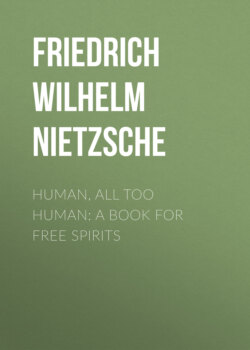Читать книгу Human, All Too Human: A Book for Free Spirits - Friedrich Wilhelm Nietzsche - Страница 6
На сайте Литреса книга снята с продажи.
3
ОглавлениеTable of Contents
It may be conjectured that a soul in which the type of "free spirit" can attain maturity and completeness had its decisive and deciding event in the form of a great emancipation or unbinding, and that prior to that event it seemed only the more firmly and forever chained to its place and pillar. What binds strongest? What cords seem almost unbreakable? In the case of mortals of a choice and lofty nature they will be those of duty: that reverence, which in youth is most typical, that timidity and tenderness in the presence of the traditionally honored and the worthy, that gratitude to the soil from which we sprung, for the hand that guided us, for the relic before which we were taught to pray—their sublimest moments will themselves bind these souls most strongly. The great liberation comes suddenly to such prisoners, like an earthquake: the young soul is all at once shaken, torn apart, cast forth—it comprehends not itself what is taking place. An involuntary onward impulse rules them with the mastery of command; a will, a wish are developed to go forward, anywhere, at any price; a strong, dangerous curiosity regarding an undiscovered world flames and flashes in all their being. "Better to die than live here"—so sounds the tempting voice: and this "here," this "at home" constitutes all they have hitherto loved. A sudden dread and distrust of that which they loved, a flash of contempt for that which is called their "duty," a mutinous, wilful, volcanic-like longing for a far away journey, strange scenes and people, annihilation, petrifaction, a hatred surmounting love, perhaps a sacrilegious impulse and look backwards, to where they so long prayed and loved, perhaps a flush of shame for what they did and at the same time an exultation at having done it, an inner, intoxicating, delightful tremor in which is betrayed the sense of victory—a victory? over what? over whom? a riddle-like victory, fruitful in questioning and well worth questioning, but the first victory, for all—such things of pain and ill belong to the history of the great liberation. And it is at the same time a malady that can destroy a man, this first outbreak of strength and will for self-destination, self-valuation, this will for free will: and how much illness is forced to the surface in the frantic strivings and singularities with which the freedman, the liberated seeks henceforth to attest his mastery over things! He roves fiercely around, with an unsatisfied longing and whatever objects he may encounter must suffer from the perilous expectancy of his pride; he tears to pieces whatever attracts him. With a sardonic laugh he overturns whatever he finds veiled or protected by any reverential awe: he would see what these things look like when they are overturned. It is wilfulness and delight in the wilfulness of it, if he now, perhaps, gives his approval to that which has heretofore been in ill repute—if, in curiosity and experiment, he penetrates stealthily to the most forbidden things. In the background during all his plunging and roaming—for he is as restless and aimless in his course as if lost in a wilderness—is the interrogation mark of a curiosity growing ever more dangerous. "Can we not upset every standard? and is good perhaps evil? and God only an invention and a subtlety of the devil? Is everything, in the last resort, false? And if we are dupes are we not on that very account dupers also? must we not be dupers also?" Such reflections lead and mislead him, ever further on, ever further away. Solitude, that dread goddess and mater saeva cupidinum, encircles and besets him, ever more threatening, more violent, more heart breaking—but who to-day knows what solitude is?
